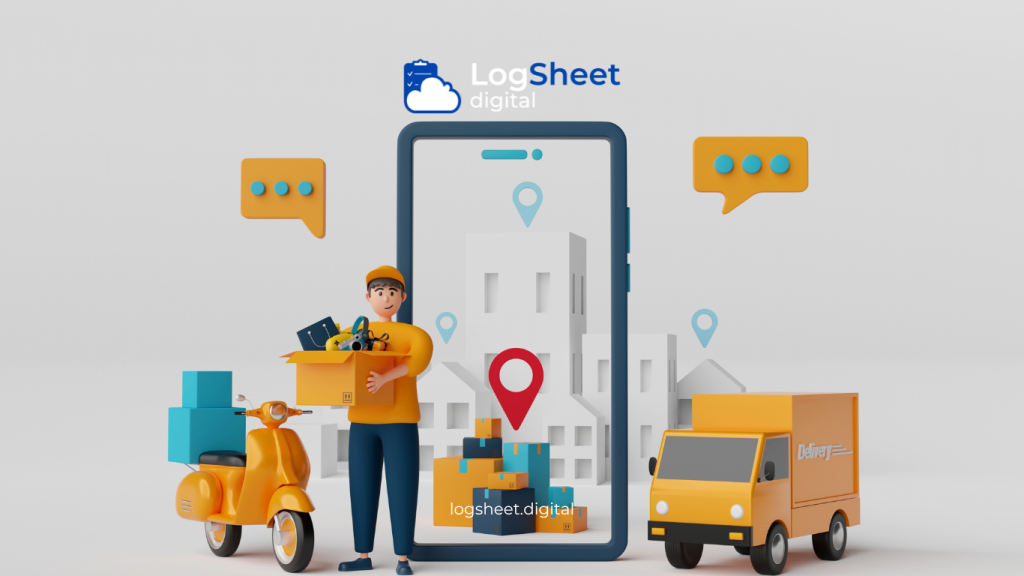In an increasingly competitive logistics world, companies must continually innovate to stay relevant and efficient. One of the innovations being widely adopted is digital logsheet. This article will explore how digital logging can enhance logistics services and boost a company’s competitive advantage.
1. Introduction to Digital Logsheet
Digital logs are the modern version of traditional paper-based record-keeping. Unlike manual logs that use paper, digital logging utilizes software and hardware technology to record, store, and analyze data electronically. This technology not only reduces paper usage but also enhances data recording efficiency and accuracy.

Read also: Overcoming Challenges of Implementing Digital Logs in Logistics Environments
2. Benefits of Digital Logsheet in Logistics Services

Read More: Digital Logs: Revolutionizing Safety Equipment Monitoring and Maintenance
2.1 Improved Data Accuracy
Digital logs reduce the likelihood of errors common in manual record-keeping. With automated systems, data is recorded more accurately and consistently, reducing the risk of errors that can impact logistics operations.
2.2 Real-Time Monitoring and Reporting
A key advantage of digital logging is the ability to monitor activities in real-time. Managers can view up-to-date data and make quicker decisions based on accurate information. This is crucial in logistics environments where time is money.
2.3 Integration with Other Systems
Digital logging can be integrated with Warehouse Management Systems (WMS), Transportation Management Systems (TMS), and Enterprise Resource Planning (ERP) systems. This integration allows for smoother information flow between departments and systems, improving overall operational efficiency.
2.4 Enhanced Data Security
Digital logs store data with robust security protocols, ensuring that sensitive information is protected from unauthorized access and reducing the risk of data loss.
3. Developing Logistics Services Through Digital Logsheet

Read More: Advancements Toward Industry 4.0: Transformation with Digital Logs in Production
3.1 Increased Operational Efficiency
Implementing digital logs reduces the time required for recording and processing data. Automation of processes helps companies save time and cut operational costs. This also allows employees to focus on more strategic tasks.
3.2 Enhanced Customer Satisfaction
With real-time monitoring systems and improved data accuracy, logistics companies can better meet customer demands. Timely deliveries and efficient inventory management contribute to higher customer satisfaction.
3.3 Strategic Analysis and Planning
Digital logs enable deeper data analysis, aiding companies in strategic planning. The collected data can be used to identify trends, forecast demand, and make better decisions for business development.
4. Challenges in Implementing Digital Logsheet

Read More: Real-Time Quality Monitoring: The Role of Digital Logs in Production Control
4.1 Initial Costs
Implementing digital logging requires a significant initial investment in software, hardware, and training. Although these costs can be high, the long-term benefits such as operational cost savings and efficiency improvements often outweigh the initial investment.
4.2 Employee Training
Transitioning from manual to digital systems requires training for employees. Investing in training is crucial to ensure that all team members can effectively use the new system and maximize the benefits of digital logging.
4.3 System Integration
Integrating digital logs with existing company systems can be challenging. This process requires time and effort, especially if the old systems are not compatible with new technologies.
4.4 Resistance to Change
Technology changes often face resistance from employees accustomed to old methods. Overcoming this resistance requires good communication and support from top management to ensure a smooth transition.
5. Case Study: Success in Implementing Digital Logsheet

Read More: Enhancing Production Transparency with Digital Logs: A Food Industry Case
For example, let’s look at a logistics company that successfully implemented digital logging. This company faced significant challenges with manual record-keeping and operational errors. After switching to digital logging, they reported significant improvements in operational efficiency, reduced recording errors, and higher customer satisfaction.
5.1 Implementation Results
- Reduction in Recording Time: The time required to record daily activities decreased by up to 50%, allowing the team to focus on other tasks.
- Increased Accuracy: Recording errors reduced from around 10% to less than 1%.
- Faster Decision-Making: Real-time data enables faster strategic decision-making.
- Customer Satisfaction: The company was better able to meet customer demands, improving overall satisfaction.
6. Conclusion

Read More: Overcoming Digital Logging Challenges in Production
Digital logging is a valuable tool for enhancing logistics services and boosting a company’s competitive edge. With benefits such as improved data accuracy, real-time monitoring, integration with other systems, and better data security, digital logging offers an effective solution to operational challenges in logistics. Although there are challenges in implementation, such as initial costs and employee training, the long-term benefits of digital logging often outweigh these investments. With proper adoption, digital logging can help logistics companies remain competitive and efficient in a tightening market.






leave your comments